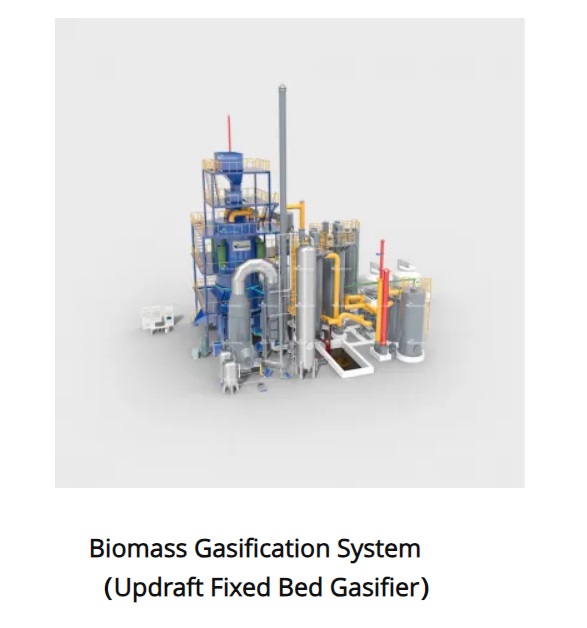

GreenTech Fuels – Biomass Gasifier for Green-Chemical Production
At GreenTech Fuels, we specialize in innovative solutions for sustainable energy and industrial applications. One of our key offerings is the Biomass Gasifier for Green-Chemical Production, which efficiently converts biomass feedstock into syngas for producing eco-friendly chemicals. This technology represents a transformative shift towards more sustainable, low-carbon processes in the chemical industry.
Biomass Gasification for Green Chemicals: Overview
The Biomass Gasifier for Green-Chemical Production leverages the process of biomass gasification to produce syngas (synthesis gas), which can be used as a feedstock for the creation of a variety of green chemicals. This method is a cleaner, more sustainable alternative to conventional petrochemical processes that rely on fossil fuels.
Biomass, including agricultural residues, forestry waste, and dedicated energy crops, is subjected to high temperatures in a low-oxygen environment within a gasifier. The resulting syngas can then be further processed to create valuable chemicals, such as methanol, ethylene, acetone, formic acid, and other important chemicals that are traditionally derived from fossil fuels.
Biomass Gasification Process for Green Chemicals
Feedstock Selection & Preparation
Biomass materials are selected based on their availability and chemical composition. These materials are cleaned, dried, and ground into fine particles to ensure uniformity and optimize the gasification process.Gasification
The prepared biomass feedstock is introduced into the gasifier where it undergoes thermochemical conversion. This process involves:Drying: Removal of moisture from the biomass.
Pyrolysis: Decomposition of the biomass into volatile gases and solid char.
Oxidation: A small amount of oxygen is introduced to generate heat, facilitating the breakdown of biomass.
Reduction: The remaining gases react with heat and produce syngas, a mixture of hydrogen (H₂), carbon monoxide (CO), carbon dioxide (CO₂), and trace gases.
Syngas Cleaning
The syngas produced contains impurities such as tars, particulate matter, and sulfur compounds. These impurities are removed through various cleaning processes, including filtration, scrubbers, and catalytic treatments, to ensure the gas is suitable for use in downstream chemical production.Conversion to Green Chemicals
Once cleaned, the syngas can be directed to a synthesis reactor, where it undergoes a chemical conversion process to produce green chemicals. Some key chemical reactions include:Methanol Synthesis: Syngas is converted into methanol, a key building block for plastics, solvents, and fuel additives.
Fischer-Tropsch Synthesis: Syngas can be converted into synthetic fuels and chemicals such as diesel, gasoline, and lubricants.
Aldehydes & Alcohols Production: Green chemicals like acetone, formaldehyde, and ethanol are produced using syngas as a feedstock.
Advantages of Biomass Gasifier for Green-Chemical Production
Sustainability: The use of biomass as feedstock reduces reliance on petrochemical resources and helps mitigate environmental degradation associated with fossil fuel extraction and refining.
Lower Carbon Footprint: The gasification process produces significantly lower emissions compared to traditional chemical production methods, contributing to a cleaner environment.
Waste-to-Value: Biomass, which might otherwise be considered waste, can be converted into valuable green chemicals, promoting circular economy principles.
Energy Efficiency: Biomass gasification systems are highly efficient, providing better energy conversion rates than conventional chemical production processes.
Diversification of Feedstocks: The ability to use various biomass sources, including agricultural and forestry residues, waste materials, and dedicated energy crops, offers flexibility in feedstock selection.
Renewable Feedstock: Biomass is a renewable resource, unlike fossil fuels, which helps ensure the long-term sustainability of chemical production processes.
Applications of Green Chemicals Produced from Biomass Gasification
Biofuels
Syngas from biomass gasification can be processed into liquid biofuels, such as ethanol and bio-diesel, which are used in transportation and energy sectors.Plastics and Polymers
Chemicals like methanol and ethylene, produced from syngas, are used in the manufacturing of bio-based plastics, contributing to the reduction of petrochemical plastic production.Industrial Chemicals
A wide range of industrial chemicals, such as acetone, formaldehyde, and solvents, can be produced from biomass-derived syngas, reducing the carbon impact of traditional chemical production.Agriculture and Fertilizers
Certain green chemicals, such as formic acid and ammonia, are used in agriculture for the production of fertilizers and pesticides.Cosmetics and Pharmaceuticals
Green chemicals like acetone and methanol are used as solvents in the production of cosmetics and pharmaceutical products.Green Energy
The syngas produced can also be used for combined heat and power (CHP) generation, contributing to local energy supply and reducing the reliance on grid power.
GreenTech Fuels Biomass Gasification for Green Chemicals: Features
Scalable Systems
GreenTech Fuels offers scalable gasification systems that can meet the needs of small to large-scale chemical production operations.Customizable Solutions
We provide tailored solutions based on the specific biomass feedstock, chemical output requirements, and sustainability goals of our clients.Advanced Gas Cleaning Technology
Our systems are equipped with state-of-the-art syngas cleaning technology to ensure the production of high-quality, impurity-free syngas.Cost-Effective Production
By using renewable biomass as feedstock, the cost of green chemical production can be significantly lower than traditional fossil fuel-based methods, offering competitive pricing in the market.Environmental Benefits
With minimal emissions and waste, biomass gasification offers an eco-friendly way to produce chemicals, contributing to reduced greenhouse gas emissions and improved air quality.
Why Choose GreenTech Fuels for Green-Chemical Biomass Gasification?
Industry Expertise: Decades of experience in biomass energy technologies, ensuring efficient and reliable solutions.
Sustainability Focus: Strong commitment to promoting sustainable practices in the chemical and energy industries.
Innovation: Continuous investment in R&D to improve biomass gasification efficiency and product quality.
Global Reach: Proven success in implementing biomass gasification systems worldwide, serving a diverse range of industries.
Contact Us
For more information on Biomass Gasifier for Green-Chemical Production, or to discuss project opportunities, please contact:
GreenTech Fuels
Address: Chouparan, Hazaribagh, Jharkhand, 825406, India
Mobile: +91 6207423061
Email: sunilsourav@gmail.com
GreenTech Fuels – Paving the Way for Sustainable Chemical Production through Biomass Gasification! 🌱
HOME
ABOUT US
PRODUCTS
PROJECTS
TECHNOLOGY
SOLUTIONS
MEDIA CENTRE
CONTACT US
© 2024. All rights reserved.
PRODUCTS
BIOWATT COMPACT BIOMASS GASIFICATION POWER GENERATION SYSTEM
BIOMASS GASIFICATION POWER PLANT
BIOMASS GASIFIER
BIOMASS CARBONIZER
BIOMASS GASIFIER FOR GREEN-CHEMICAL
BIOMASS GASIFICATION BOILER
BIOMASS CARBONIZATION POWER PLANT
BIOMASS CARBONIZATION BOILER
COAL GASIFICATION POWER PLANT
COAL GASIFIER
WASTE GASIFIER
WASTE GASIFICATION POWER PLANT
SYNGAS GENERATOR SET
PRODUCER GAS GENERATOR SET
BIOMASS GAS GENERATOR SET
COAL GAS GENERATOR SET
GAS PURIFICATION SYSTEM
DECORBONIZATION
GREENTECH SOLAR
NANO HYDROPOWER
GREENTECH BATTERIES
HUSKTECH
CONTACT US
GREENTECH FUELS
GREENTECH HABITAT CENTER
CHOUPARAN, HAZARIBAGH, JHARKHAND, INDIA - 825406
📞 +91 6207423061
📞 +91 9973352599
www.greentechfuels.in
📧 info@greentechfuels.in


